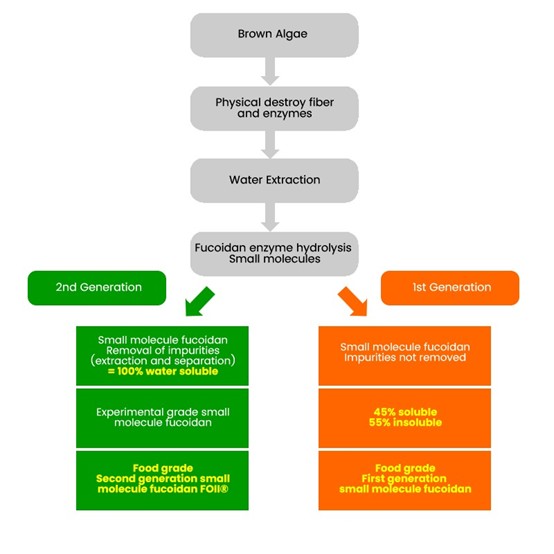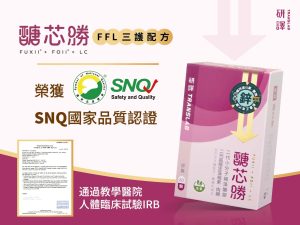Commercial Times News

The Taiwan Fucoidan Development Society recently held its 15th International Symposium, where numerous research findings on fucoidan were once again announced. As one of the society’s founders and currently the Vice President of R&D at Translab International Co., Ltd.,
I look back on my journey and discover that since leaving the National Taiwan Health Research Institutes to join the industry, I have been deeply involved in small molecule fucoidan research for 16 years.
In 2011, I collaborated with experts and scholars to establish the Taiwan Fucoidan Development Society, and served as its founding Secretary-General.
At the time, there were numerous international research findings on fucoidan. However, apart from Dr. Huang Pei-an, then a distinguished researcher at the Council of Agriculture’s Fisheries Research Institute, no other medical or research institution in Taiwan was dedicated to fucoidan research, let alone publishing relevant research papers in international medical journals. After further research, I finally discovered that Professor Hsu Hsien-yeh, then a professor in the Department of Medical Technology at Yang-Ming University, had previously been involved in fucoidan research. Dr. Huang and I immediately invited Professor Hsu to join the small molecule fucoidan research effort and serve as the founding president of the society. This marked the beginning of Taiwan’s small molecule fucoidan research team. Over this period, the team has continuously integrated other Taiwanese and international researchers, and has utilized the research-grade small molecule fucoidan they have developed and extracted to various research fields.
Our research team, through scientific expertise, has specifically defined and simplified the term “Oligo Fucoidan,” a low-molecule fucoidan studied by Dr. Huang, to distinguish it from large-molecule fucoidans from other countries. In 2010, Dr. Huang Pei-an published the first international medical publication on low-molecule fucoidan from Taiwan. As of 2024, nearly 70 medical publications have been published using Taiwanese low-molecule fucoidan as a raw material, establishing it as a key player in global medical research.
By 2017, Taiwan’s small-molecule fucoidan had already undergone human clinical trials and published medical research. Despite this, the R&D team didn’t stop there. Since 2008, the small-molecule fucoidan used in scientific research (laboratory-produced products) has been shown to be highly active, but when applied to food applications (commercial production), it still produces a large amount of useless precipitate (first-generation small-molecule fucoidan), and the technical barrier of fully solubilizing it in water has not been overcome.
Academic research clearly defines functionally active fucoidan as a water-soluble polysaccharide that is completely soluble in water and carries a negative charge. Over the years, small-molecule fucoidan has been used as the experimental material in cell, animal, and human trials, as well as in published scientific literature. Therefore, to ensure that food-grade small-molecule fucoidan is more consistent with research-grade fucoidan, the R&D team spent nearly 12 years developing an advanced food-grade small-molecule fucoidan extraction technology, the so-called “second-generation small-molecule fucoidan,” by introducing high-pressure filtration and porous instant dissolution technologies. In 2020, the team finally developed this advanced food-grade small-molecule fucoidan extraction technology.

Figure 2: Improvements in the second-generation small molecule fucoidan extraction process
After testing, its purity and activity have been significantly improved, achieving high water-soluble purity and virtually eliminating the large amount of useless insoluble precipitated impurities found in first-generation small-molecule fucoidan. This development has enabled the purity and activity of second-generation small-molecule fucoidan to truly reach the level of raw materials used in published scientific literature through years of cell, animal, and human clinical trials. Furthermore, human trials have confirmed that second-generation small-molecule fucoidan is not only highly safe, but also highly regarded in clinical practice.
Taiwan also has numerous academic institutions currently researching unique materials that have the potential to be developed on a commercial scale and applied in health support applications. Past experience shows that maintaining academic neutrality is crucial for integrating industry, government, medical, and research efforts. The founding mission of the Taiwan Fucoidan Society was to “enhance and strengthen academic research on fucoidan,” emphasizing the desire for all parties involved to objectively discuss Taiwan’s small-molecule fucoidan based on scientific research data.
The copyright of scientific research articles published by researchers belongs to the respective journals. Before publication, the journals must verify that the research process is free of commercial activities before accepting and publishing. Fortunately, the medical articles currently published in Taiwan’s small molecule fucoidan journals maintain academic neutrality and are not linked to any commercial activities. Failure to do so would not only violate academic ethics but also put researchers in violation of the regulations of the journals and their affiliated institutions. Therefore, protecting the academic value and reputation of researchers is absolutely paramount to the successful continuation of academic integration.
As long as the research results published in academic journals are legitimately sourced, they can be cited by all within the established standards. However, some companies are citing incorrect information, publishing inaccurate statements, and misattributing the copyright of the literature to the academic society. This is a complete misconception and infringes on the intellectual property rights of international journal publishers. As long as the technical background and extraction materials meet the definition of small molecule fucoidan, all parties are welcome to cite relevant research results for discussion and use them as a foundation for further research. This will ensure that Taiwan’s small molecule fucoidan research and academic society are open to diverse research, allowing this Taiwanese pride to continue to advance and shine on the stage of International biotech!
(Author: Yang Zhonghan, Founding Secretary-General of the Taiwan Fucoidan Development Society)



